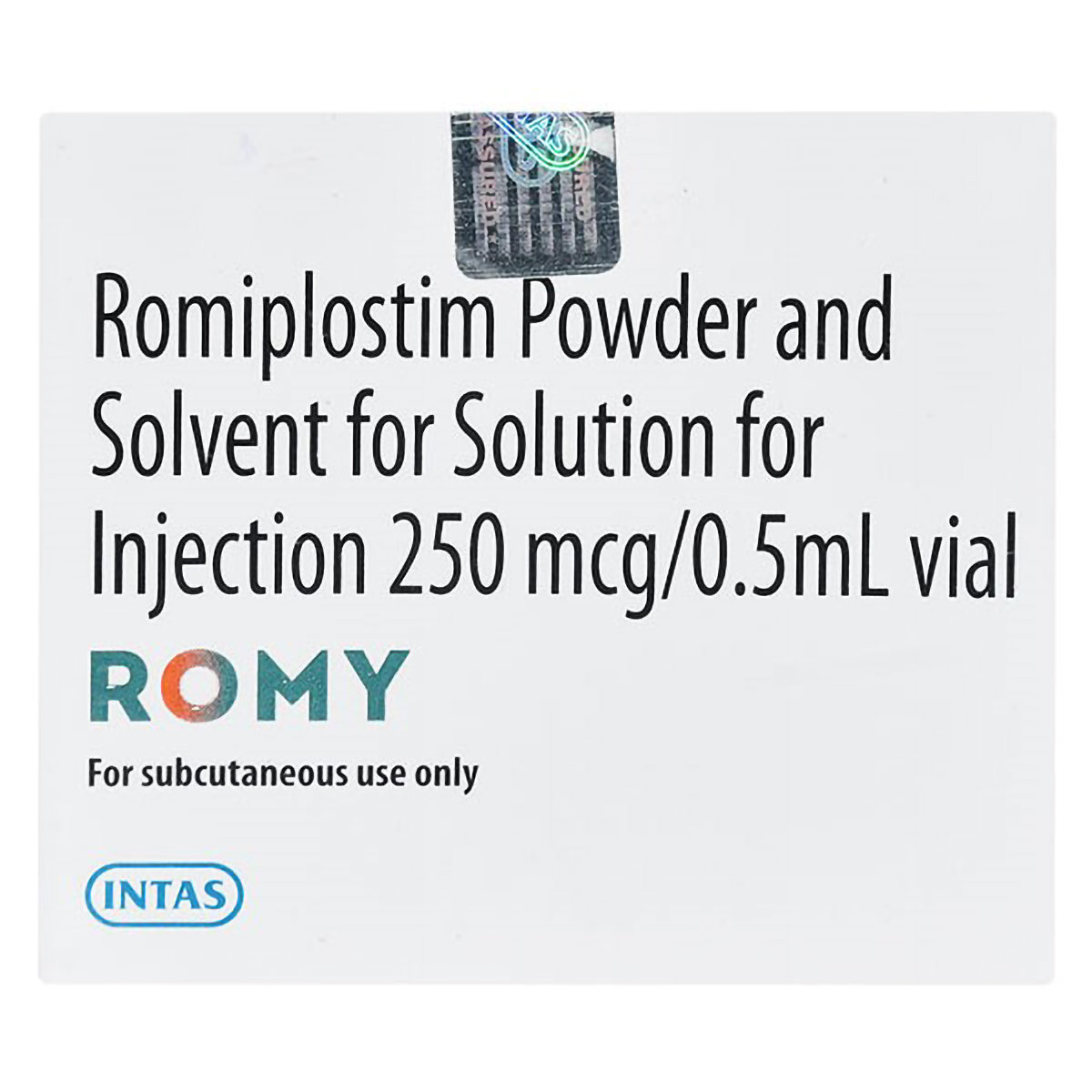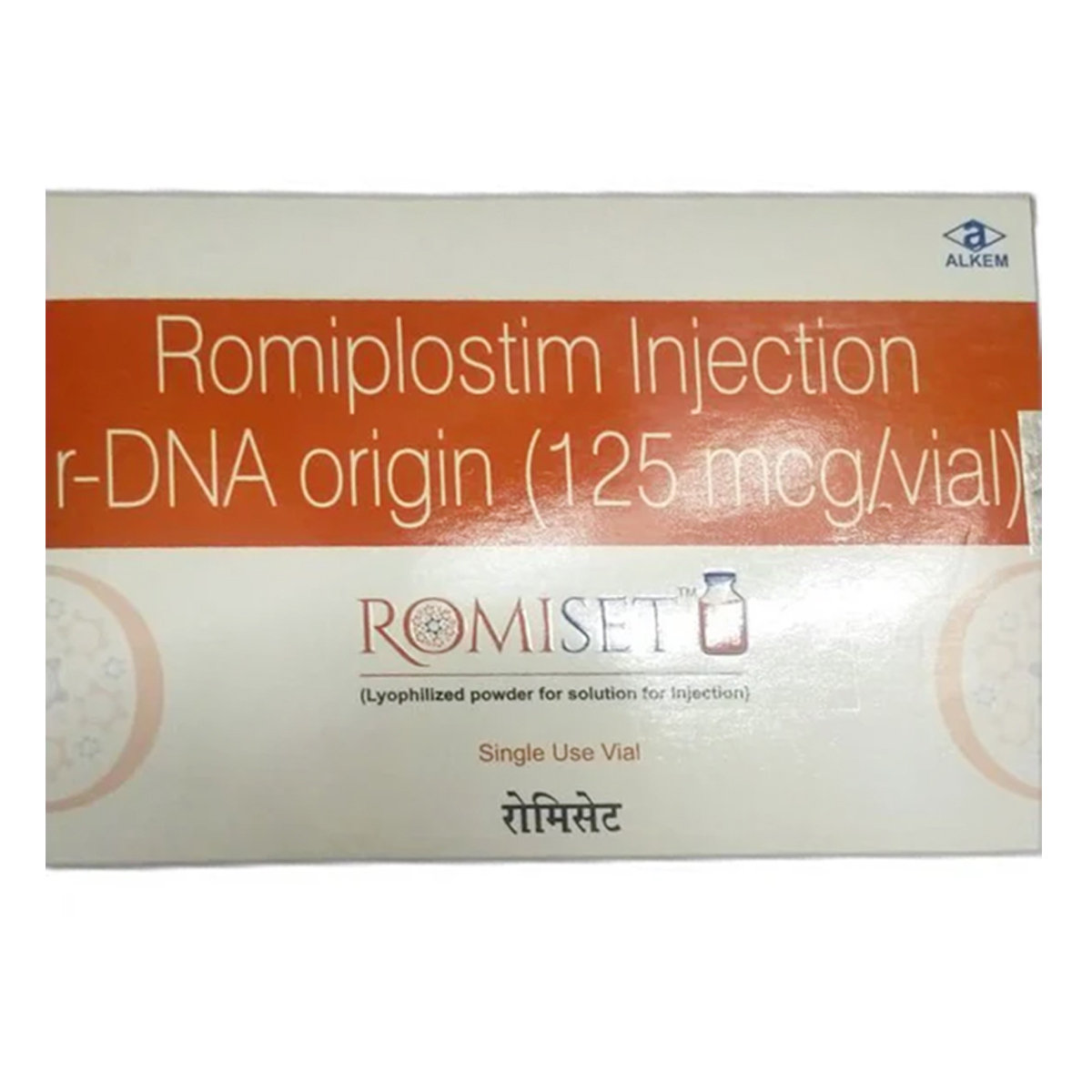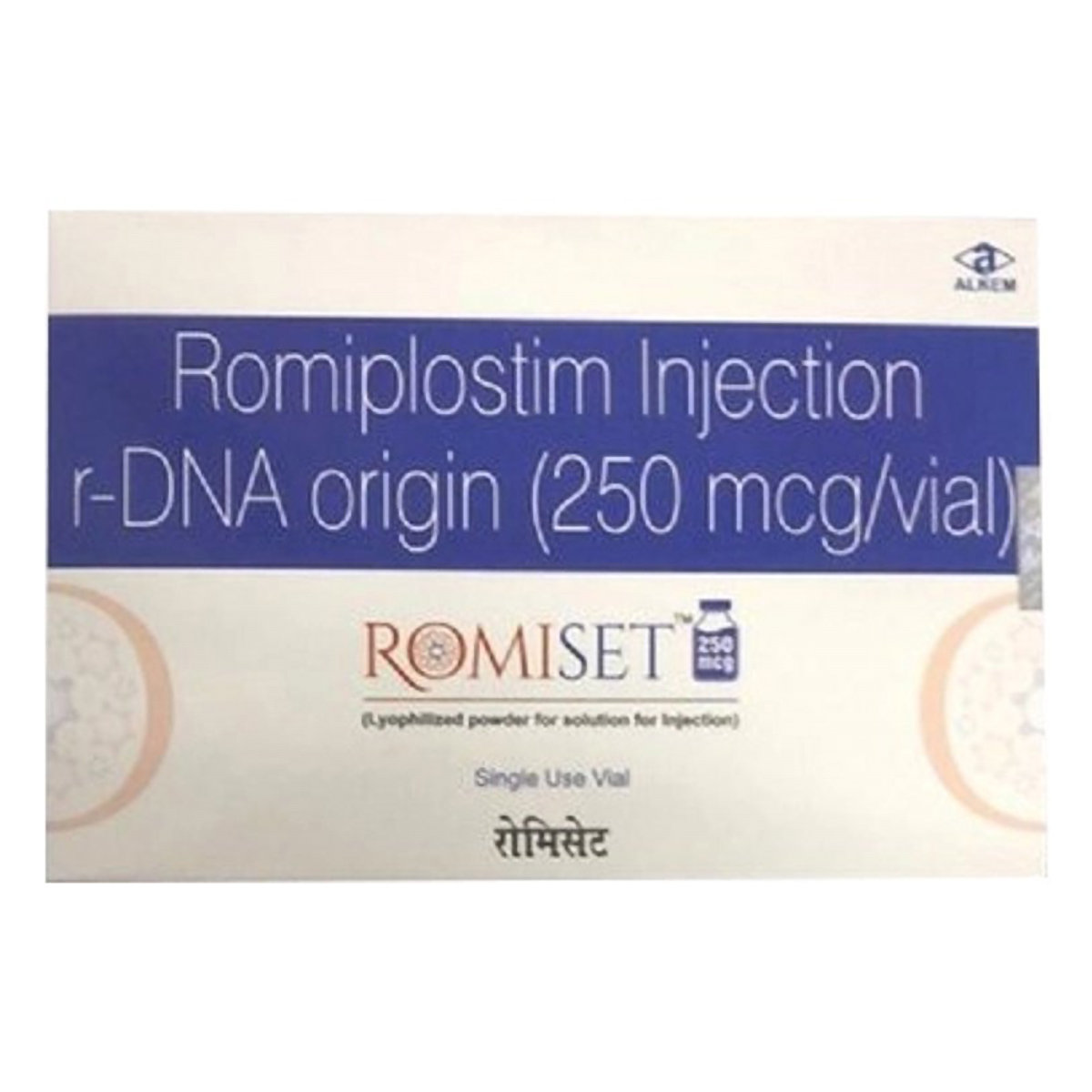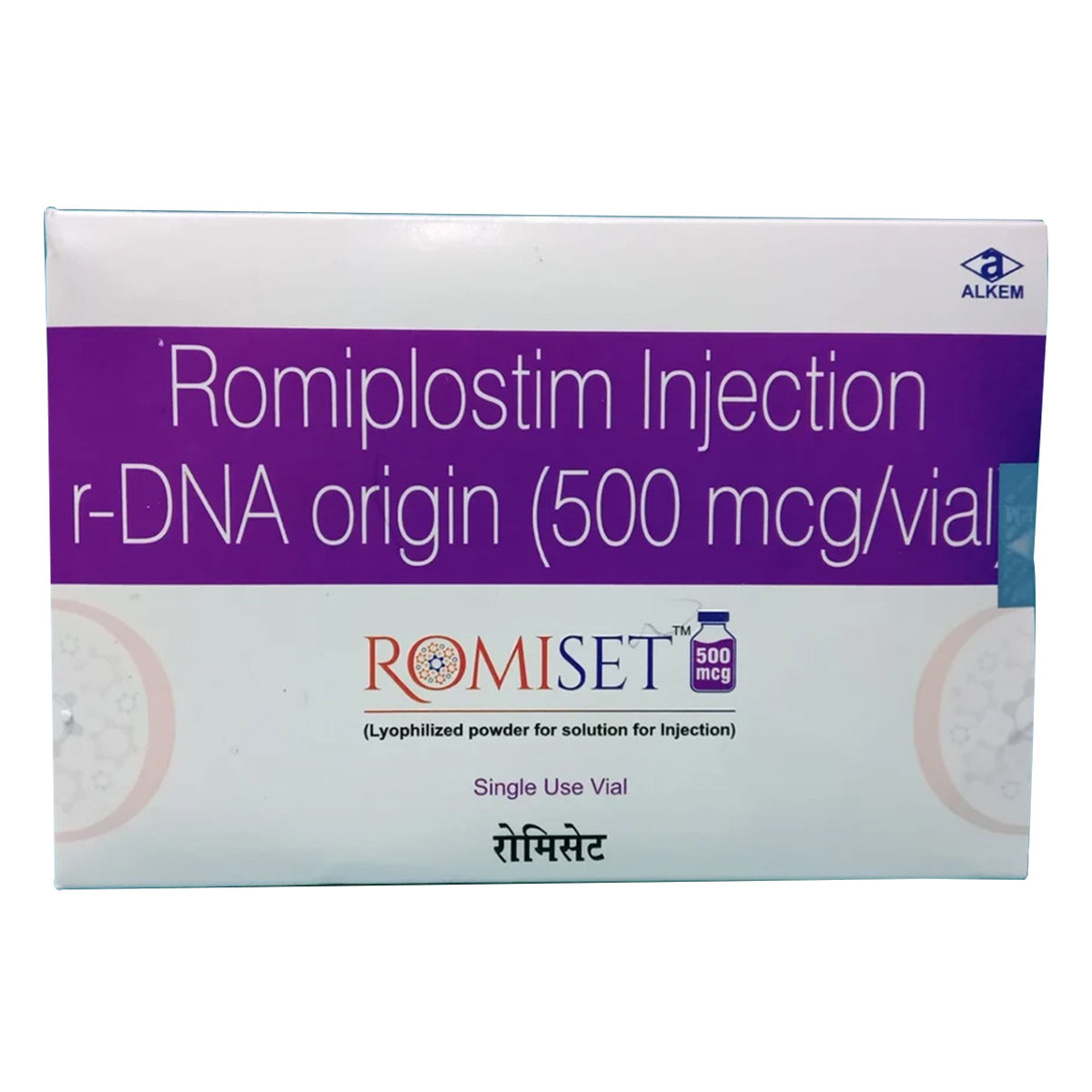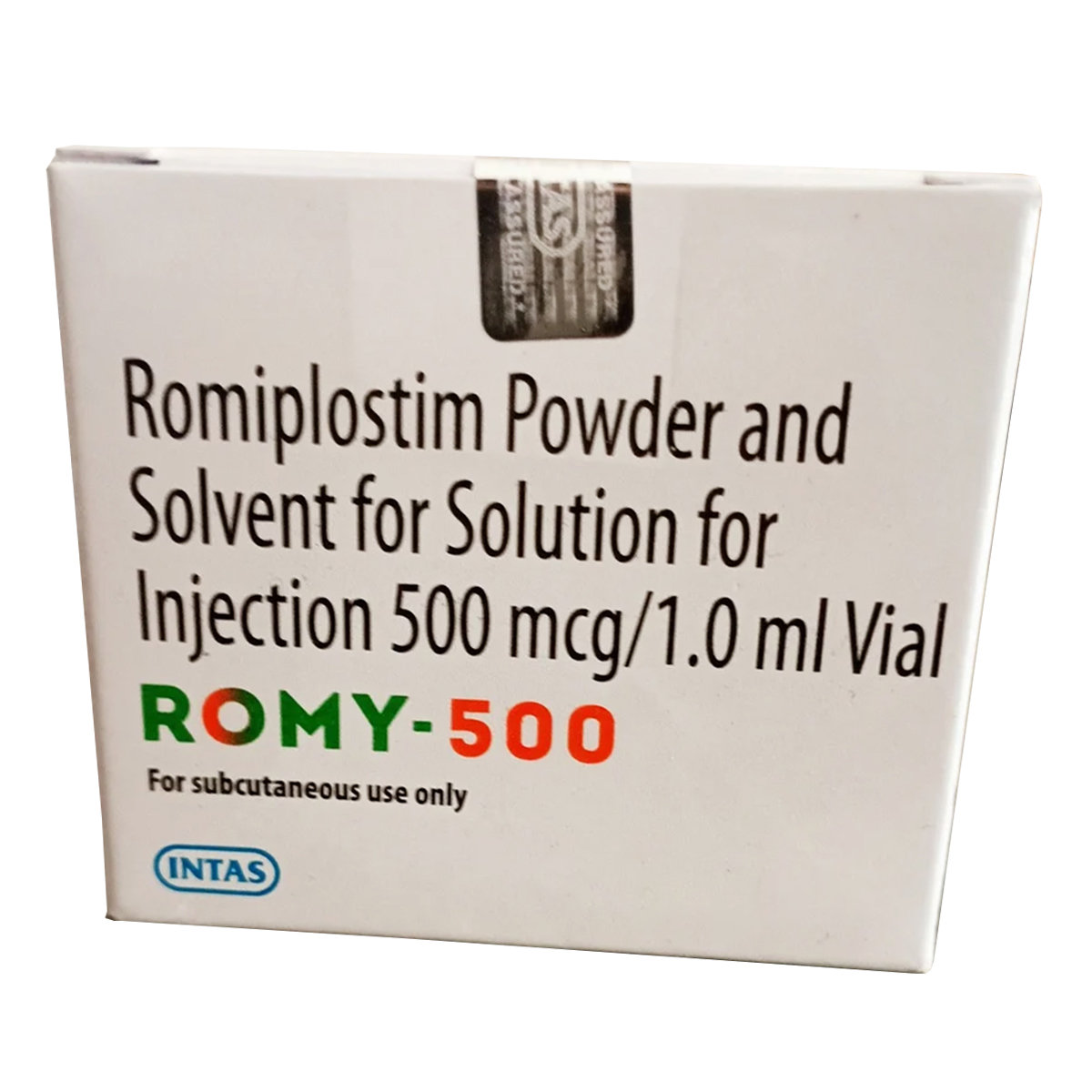Romiplostim
About Romiplostim
Romiplostim belongs to the class of 'platelet-stimulating agents' primarily used to treat chronic immune thrombocytopenia in adults who have had an insufficient response to corticosteroids, immunoglobulins, or splenectomy. Immune thrombocytopenia, often called idiopathic thrombocytopenic purpura (ITP), is an immune disorder characterised by low platelet counts.
Romiplostim contains 'Romiplostim,' which is a thrombopoietin receptor agonist that functions similarly to thrombopoietin. Romiplostim promotes platelet formation by activating the thrombopoietin receptor. Thereby, Romiplostim helps treat immune thrombocytopenia effectively.
Romiplostim will be administered by the healthcare professional. In some cases, Romiplostim may cause common side effects like headache, joint pain, dizziness, trouble sleeping, muscle tenderness or weakness, pain in the arms and legs and indigestion. These side effects may vary individually. Most of these side effects do not require medical attention and will resolve gradually over time. However, you are advised to talk to your doctor if you experience these side effects persistently.
Notify your doctor if you have allergic reactions to Romiplostim or other medications. You must inform your doctor if you have leukaemia (blood or bone marrow cancer), bleeding or clotting disorders, or heart, kidney, or liver problems. Romiplostim is not recommended during pregnancy unless indicated by the doctor. Romiplostim may make you dizzy; hence drive or operate machinery only when you are alert. Romiplostim is not recommended for use during breastfeeding.
Uses of Romiplostim
Medicinal Benefits
Romiplostim contains 'Romiplostim' which belongs to the class of 'thrombopoietin receptor agonists' used to treat low blood platelet count in patients with immune thrombocytopenia. Romiplostim promotes platelet formation by activating the thrombopoietin receptor. Thereby, Romiplostim helps treat immune thrombocytopenia effectively.
Directions for Use
Storage
Side Effects of Romiplostim
- Joint pain (arthralgia)
- Dizziness
- Insomnia (inability to sleep)
- Muscle pain (myalgia)
- Pain in extremities
- Abdominal pain
- Shoulder pain
- Dyspepsia (indigestion)
- Paresthesia (tingling or pricking sensation)
- Headache
- Sore throat
Drug Warnings
Before beginning Romiplostim, notify your doctor if you have had any allergic reactions to Romiplostim or any other medications. You must notify your doctor if you have blood or bone marrow cancer (leukaemia), bleeding or clotting disorders, heart, kidney, or liver problems. Romiplostim is not recommended during pregnancy unless indicated by the doctor. Romiplostim may make you dizzy hence do not attempt to drive or operate machinery until you are physically stable and mentally alert. Romiplostim should never be used to normalize platelet counts; Romiplostim should only be used in ITP patients whose thrombocytopenia and clinical condition increase the risk of bleeding. Romiplostim is not recommended for use during breastfeeding.
Drug Interactions
Drug-Drug Interactions: Romiplostim may interact with anti-cancer medication (e.g. carfilzomib, ibritumomab) and medication used to treat myasthenia gravis (e.g. efgartigimod alfa).
Drug-Food Interactions: No interactions found/established.
Drug-Disease Interactions: Romiplostim may interact with disease conditions like leukaemia, liver or kidney impairment.
Drug-Drug Interactions Checker List:
Safety Advice

Alcohol
cautionYou are recommended not to consume alcohol along with Romiplostim to avoid unpleasant side effects.

Pregnancy
cautionRomiplostim is not recommended in pregnancy unless indicated by the doctor. Please consult your doctor if you are pregnant or planning to conceive.

Breast Feeding
unsafeBreast-feeding must be avoided during treatment with Romiplostim. Please consult your doctor if you have any concerns.

Driving
cautionRomiplostim may cause dizziness. Hence, it is recommended not to drive or operate machinery until you are mentally alert.

Liver
cautionRomiplostim is not recommended particularly if you have a history of chronic liver disease/conditions. Please consult your doctor if you have any concerns

Kidney
cautionLimited information was available for the usage of Romiplostim in patients suffering from kidney illness. Please consult your doctor if you have any concerns. Your doctor will prescribe only if the benefits outweigh the risks.

Children
cautionRomiplostim is not recommended for children less than one year of age.
Habit Forming
Diet & Lifestyle Advise
- Eating papaya is the greatest natural therapy for increasing platelet count; you can also use a blend of papaya leaves.
- A high protein diet, which includes lean meat, chicken, crab, turkey, beef, and fish, can help improve platelet count.
- Include iron-rich foods such as pomegranate, beetroot, green leafy vegetables, carrots, raisins, oranges, peanuts, kidney beans, and black-eyed peas.
- Platelet counts can be increased by eating foods high in vitamin C, such as guava, black currant, red pepper, kiwi, green peppers, orange, strawberries, pineapple, peas, mango, grapefruit, and broccoli.
- Exercise on a regular basis to keep your body and mind healthy.
- Smoking and consuming alcohol should be avoided.
- To reduce the risk of bleeding, avoid activities such as contact sports and the use of sharp objects such as nail cutters and razors.
Patients Concern
Disease/Condition Glossary
Immune thrombocytopenia: It is an immune disorder characterised by low platelet counts and abnormal blood clotting. It happens when the immune system destroys its own platelets by mistake. Immune thrombocytopenia symptoms include easy bruising, bleeding from the gums and nose, blood in the urine and stools, heavy menstruation, and pinpoint-sized reddish-purple patches on the lower thighs.
FAQs
Romiplostim contains Romiplostim, which promotes platelet formation by activating the thrombopoietin receptor. Thus Romiplostim lowers the risk of bleeding episodes in diseases like immune thrombocytopenia and other associated conditions.
Immune thrombocytopenia is an autoimmune disorder in which the immune system misidentifies platelets as foreign bodies and destroys them. It can occur due to a virus, vaccination, or certain drugs. But the origin is unknown in the majority of cases.
Romiplostim is only advised for patients who have not responded adequately to other treatments such as corticosteroids, immunoglobulins, or splenectomy.
Idiopathic thrombocytopenic purpura is typically diagnosed with blood tests such as complete blood count and antiplatelet-antibody test.
Romiplostim is not approved to treat thrombocytopenia caused by Myelodysplastic syndrome (MDS) or any other cause of thrombocytopenia apart from chronic ITP.




